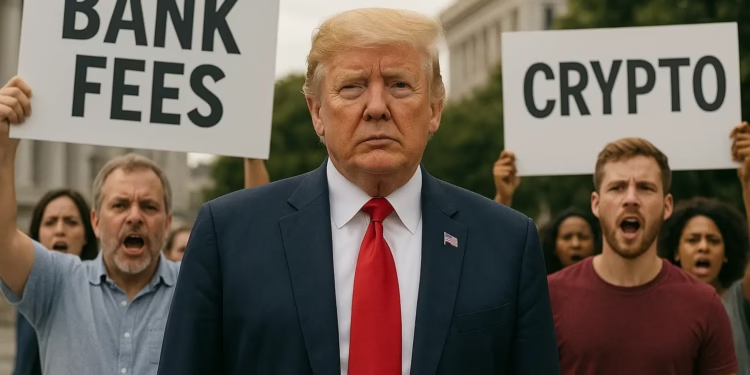U.S. crypto and fintech firms are pushing back against rising crypto bank fees, warning President Donald Trump that the charges could stifle innovation, limit consumer choice, and erode America’s competitiveness in global financial technology.
The dispute centers on whether customer financial data should remain freely accessible to approved third parties under existing open banking rules.
Industry warns of economic and innovation risks
In a letter sent Wednesday, executives from Gemini, Robinhood, the Crypto Council for Innovation, and the Blockchain Association accused major U.S. banks of seeking to “preserve their market position by imposing exorbitant new ‘account access’ fees” that would make it more expensive for consumers to connect accounts to non-bank financial platforms.
“Severing this connection will drive innovation offshore and diminish U.S. influence,” the letter stated, aligning the fight over crypto bank data fees with Trump’s broader pro-digital asset agenda.
The signatories argued that these charges could disrupt critical financial linkages that support cryptocurrency exchanges, artificial intelligence-driven finance tools, and digital payments systems. They claim that removing free access would deter new market entrants, limit competition, and harm the long-term competitiveness of the U.S. financial sector.
Roots in Biden-era open banking rule
The policy clash originates from the Consumer Financial Protection Bureau’s (CFPB) “open banking rule,” finalized in October 2024 under then-President Joe Biden. The rule grants customers the right to share their bank data with approved third-party providers at no cost. While welcomed by crypto firms and fintech startups, it faced immediate opposition from banking trade associations, who filed legal challenges.
Initially, Trump sided with banks, supporting efforts to repeal the rule. However, in late July, after sustained lobbying from the crypto industry, the administration reversed its position and informed a federal judge it would maintain the regulation while drafting a revised version.
“Free access to customer bank data is essential for the development of decentralized finance and competitive payments markets,” — Sheila Warren, CEO, Crypto Council for Innovation, told reporters. “Imposing crypto bank data fees would be a direct step backward.”
Banks push back on cost and fairness grounds
The American Bankers Association (ABA), leading the industry opposition, has rejected the accusations. In a statement Wednesday, the ABA claimed the crypto sector was seeking “government price fixing” and preferential treatment under the guise of open competition.
“The double standard these companies want to perpetuate—where they may charge fees for service while banks are expected to provide the same service for free—is absurd,” the ABA said.
Bank representatives argue that crypto bank data fees would simply cover the substantial infrastructure and cybersecurity costs associated with maintaining secure, real-time customer data sharing.
They also contend that fintech and crypto firms profit from bank-funded systems without contributing to their upkeep, effectively shifting costs onto traditional financial institutions.
Dispute tied to broader pro-crypto policy moves
The crypto bank data fees debate unfolds against a backdrop of new pro-digital asset initiatives from the Trump administration. This week, the president signed an executive order directing regulators to remove barriers preventing 401(k) retirement plans from offering cryptocurrency and other alternative assets.
If implemented, the measure could allow millions of Americans to allocate a portion of their retirement savings to Bitcoin and similar investments.
Trump also nominated economist Stephen Miran, a known advocate for digital assets, to the Federal Reserve Board of Governors. His nomination is seen by industry observers as reinforcing the administration’s commitment to integrating crypto into the U.S. financial system.
For policy makers, the outcome of this dispute could establish a precedent for future regulation of financial data rights. Kristin Smith, CEO of the Blockchain Association, warned: “Allowing crypto bank data fees would erode consumer empowerment and slow the modernization of America’s financial infrastructure.”










